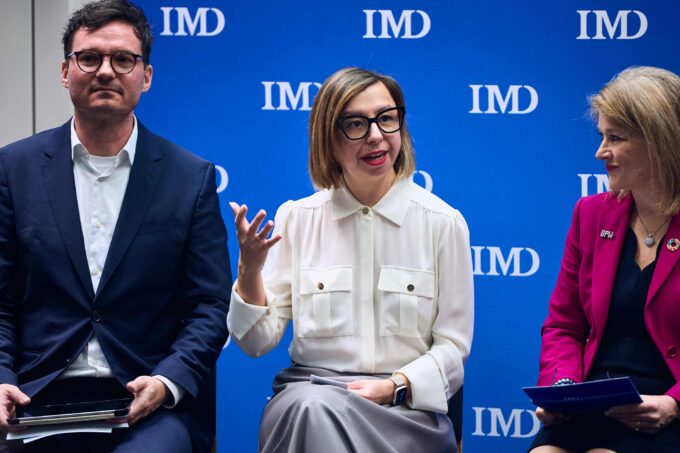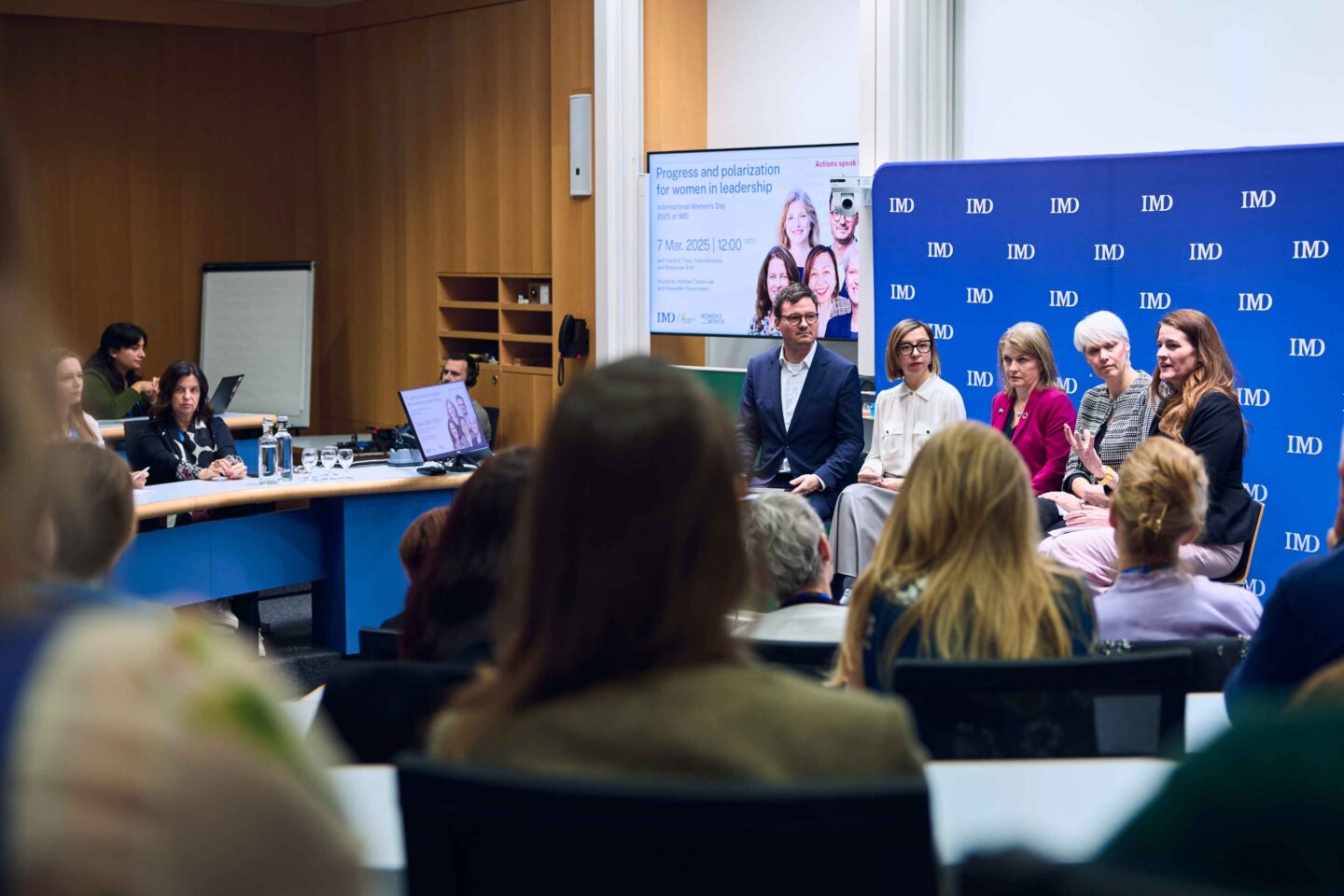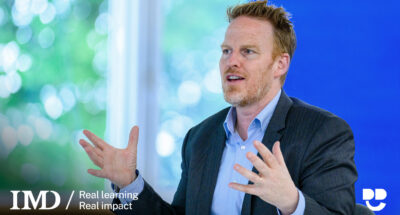
Six ways boards can take the lead in an era of mistrust
Board members have a central role to play in helping organizations steer a safe path in a polarized and skeptical world....
Audio available
7 March 2025 • by Heather Cairns-Lee, Alexander Fleischmann in Diversity, Equity, and Inclusion
As businesses face growing polarization on DE&I, companies must embed inclusion into their core strategy, empower leaders to drive change, and ensure that the progress made so far is not quietly undone....
When it comes to the representation of women in executive roles over the past few years, are we making strides or losing ground? While European regulations and corporate initiatives signal that progress is being made on this side of the Atlantic, the rollback of diversity, equity, and inclusion (DEI) programs in major US companies paints a different picture.
This formed the backdrop for today’s panel discussion hosted in collaboration with BPW Lake Geneva, part of a 95-year-old network advocating for women’s equality.
Featuring ADM’s Mayka van Acht, IMD’s Sarah Toms, and Yulia Voronina, who co-leads the IMD Inclusive Leadership Alumni Community, and moderated by IMD’s Heather Cairns-Lee and Alexander Fleischmann, the panel addressed the tensions that are shaping today’s workplace dynamics – polarization versus progress, inclusion versus division, and how leaders and organizations should respond.
It's almost impossible to go back, because ‘back’ doesn't exist anymore.Yulia Voronina, eCommerce Lead, Nestlé Nutrition Europe

The panel discussion focused on the evolution of DE&I from a culture of diversity to one of inclusion.
While progress is being made, the reality is that many US companies are dismantling their DE&I initiatives. For Sarah Toms, Chief Innovation Officer at IMD, the speed of these reversals was staggering. “We had this false sense of security that these things would continue, and we would continue to see progress,” she said, citing the abrupt cancellation of DE&I programs at companies like Google, which had published a report on how diverse teams leads to innovation. “This is shocking, right? How do we handle this?”
For Toms, one action that individuals could take is to consider what companies they choose to support through their purchasing power. “We have to remember that we all vote every time we take our credit card out,” she noted. “So, we can vote. And we know that standing up against what this means is what’s going to help that course correction happen.”
During the event, participants were invited to take part in a live word cloud exercise, which highlighted audience sentiment: words such as “confusion,” “uncertainty,” and “disappointing” appeared to dominate but a flicker of “hope” did appear. The panel discussed the palpable anxiety among professionals about speaking out on gender and inclusion issues within their own organizations.
For companies seeking to maintain progress, the structural and cultural embedding of inclusion is key. “It’s important to recognize this moment, this is a defining moment. We don’t know how long it lasts. We don’t know what the outcome will be,” said Yulia Voronina. “We need to have this dialog, and we need to participate because if you don’t participate, don’t expect someone to protect, defend, or present your position.”
The panel agreed that it was important to ensure that inclusion is embedded into core business operations, such as hiring and leadership development processes, rather than being sidelined. They stressed the importance of helping others to thrive by considering how to make workplaces more inclusive for people from all backgrounds.

“We had this false sense of security that these things would continue, and we would continue to see progress.”Sarah Toms, Chief Innovation Officer at IMD
One emerging trend is the potential for Europe to attract talent fleeing restrictive policies in the US. “We have seen more applications from US-based faculty,” noted Toms, suggesting a possible ‘brain drain’ as professionals seek workplaces that prioritize inclusion and innovation.
Yet, Europe has its own challenges. The Economist’s glass-ceiling index places Switzerland 26th out of 29 countries in terms of workplace equality, highlighting the persistence of barriers for women in leadership. Switzerland has 32.4% female representation in managerial positions and 34.4% in board roles, despite women being more than 50% of the population.
As the discussion ended, the panelists reinforced a call to action – progress is possible, but it requires deliberate effort. Companies must integrate inclusion into their core business strategy. Individuals must advocate within their spheres of influence. Communities must sustain momentum.
The session ended with a powerful analogy: “We all have two hands – one hand to receive help and another to help others.”
Progress is not just about policies but about individuals stepping up, creating inclusive cultures, and sustaining momentum, even when the external environment remains so uncertain.
This article is inspired by a live webinar Progress or Polarization for Women in Leadership, which took place on 7 March to mark International Women’s Day 2025 at IMD, in collaboration with BPW Lake Geneva.
Further reading: Mind the Gap white paper

Affiliate Professor of Leadership and Communication
Heather Cairns-Lee is Affiliate Professor of Leadership and Communication at IMD. She is a member of IMD’s Equity, Inclusion and Diversity Council and an experienced executive coach. She works to develop reflective and responsible leaders and caring inclusive cultures in organizations and society.

Equity, Inclusion and Diversity Research Affiliate
Alexander received his PhD in organization studies from WU Vienna University of Economics and Business researching diversity in alternative organizations. His research focuses on inclusion and how it is measured, inclusive language and images, ableism and LGBTQ+ at work as well as possibilities to organize solidarity. His work has appeared in, amongst others, Organization; Work, Employment and Society; Journal of Management and Organization and Gender in Management: An International Journal.

1 day ago • by Peter Voser in Geopolitics
Board members have a central role to play in helping organizations steer a safe path in a polarized and skeptical world....

13 May 2025 • by Simon J. Evenett in Geopolitics
As tariff tensions simmer and uncertainty clouds the future of global trade, freight industry leaders reflect on how businesses can brace for potential shortages, adapt supply chains, and stay resilient in a...

1 May 2025 • by David Bach, Felix Zeltner in Geopolitics
In the latest episode, IMD President David Bach explains the vital importance of the partnership between the US government and the elite research universities, what we can learn from the vibrancy of...

16 April 2025 • by Carlos Cordon, Salvatore Cantale, Toni Yañez in Geopolitics
With the US Administration poised to introduce its steepest tariffs in over a century if negotiations to end a tariff war fail, companies across the Medtech and Luxury sectors could revisit protectionist...
Explore first person business intelligence from top minds curated for a global executive audience